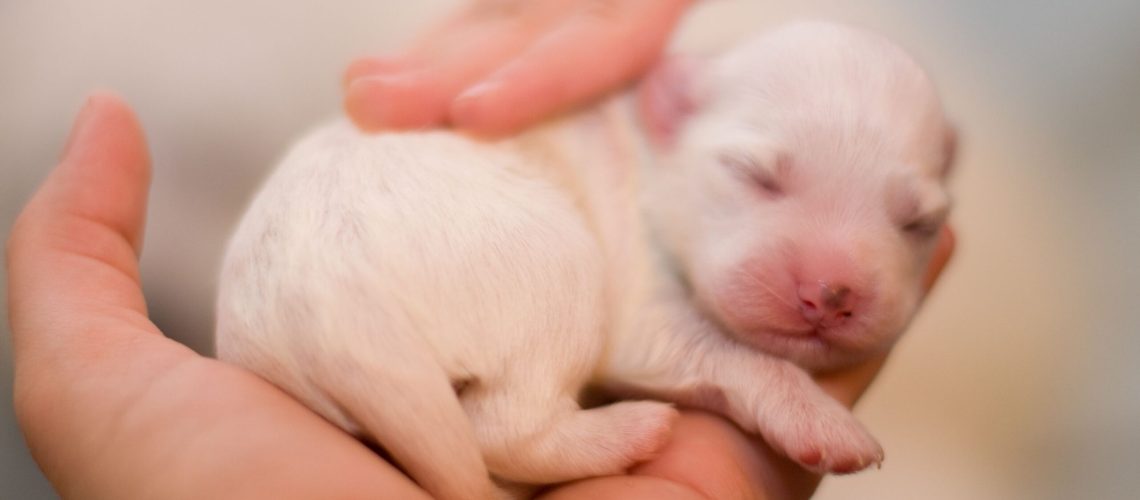This article explores the fascinating journey of puppy development, focusing on their growth and milestones during the first week of life.
Key Takeaways:
- Puppies are born blind and deaf, relying solely on their sense of touch and smell.
- During the first week, puppies spend most of their time sleeping and nursing from their mother.
- Their body temperature is unable to regulate independently, so they rely on their mother for warmth.
- Puppies begin to gain weight rapidly during this period, doubling or even tripling their birth weight by the end of the week.
- At around one week old, puppies start to wiggle and crawl, displaying some early signs of mobility.
What happens to a puppy when it is born?
When a puppy is born, it enters the world after spending about nine weeks growing inside its mother's womb. The birth process, also known as whelping, can be both exciting and exhausting for the mother dog. She will usually find a quiet and comfortable place to give birth, like a cozy corner or a specially prepared whelping box.
Once the puppy is born, it is covered in a thin membrane called the amniotic sac. The mother dog will quickly lick and clean the puppy to remove this sac and stimulate its breathing. This cleaning process also helps to bond the mother with her newborn puppies.
The first thing a newborn puppy needs to do is take its first breath. It may take a few moments for the puppy to start breathing on its own, but once it does, it will let out tiny squeaks or cries. These sounds signal that the puppy is alive and ready to begin its journey of growth and development.
Whelping Box:
A whelping box is a special area set up for a pregnant dog to give birth and care for her puppies during their early weeks of life. It provides a safe and comfortable environment where the mother can feel secure while tending to her newborns. A typical whelping box has low sides to prevent the puppies from accidentally falling out but still allows easy access for the mother.
Bonding:
Bonding between a mother dog and her puppies is crucial for their well-being. When the mother licks her puppies after birth, she not only cleans them but also stimulates their circulation and takes in their scent. This interaction helps establish an emotional connection between them.
How do newborn puppies communicate with their mother and littermates?
Newborn puppies are not able to see or hear immediately after birth, but they have other ways of communicating with their mother and littermates. One of the primary ways they communicate is through touch. Puppies use their sense of touch to navigate their surroundings and locate their mother for warmth and nourishment.
They also use touch to communicate with their littermates. When puppies are together, they will often nuzzle each other or snuggle close for comfort. This physical contact helps them feel secure and connected to their siblings.
In addition to touch, newborn puppies also communicate through scent. Each puppy has a unique smell that allows the mother dog and littermates to recognize them. This scent plays a vital role in bonding and identifying family members within the litter.
Sense of Touch:
The sense of touch is essential for newborn puppies as it helps them explore their environment and find their way around. They have sensitive nerve endings in their skin that allow them to feel warmth, pressure, and texture. The mother's fur provides a soft surface for the puppies to snuggle against, keeping them warm and comfortable.
Bonding through Scent:
Puppies have scent glands located in various parts of their bodies, such as the paws and anal area. These glands produce odors that are unique to each puppy, helping them identify themselves and recognize familiar scents within their family. The mother dog uses her sense of smell to locate her puppies and establish a strong bond with them.
The importance of staying close to the mother during the first week of life
During the first week of life, it is crucial for newborn puppies to stay close to their mother. The mother provides essential care such as warmth, nourishment, and protection from potential dangers. By staying near her, the puppies can receive the care they need for healthy development.
The mother's body heat helps regulate the puppies' body temperature, keeping them warm and comfortable. Newborn puppies are not yet able to regulate their own body temperature effectively, so being close to their mother is vital for their survival.
In addition to warmth, the mother's milk provides all the necessary nutrients for the puppies' growth and development. It contains antibodies that help boost their immune system and protect them from infections. By staying close to their mother, the puppies can easily access her milk whenever they are hungry.
Body Temperature Regulation:
Newborn puppies rely on their mother's body heat to maintain a stable body temperature. Their fur is not fully developed at this stage, making them more susceptible to cold temperatures. By snuggling against their mother's warm body, they can stay cozy and avoid hypothermia.
Nutritional Benefits:
During the first week of life, newborn puppies rely solely on their mother's milk for nutrition. The milk provides a perfect balance of proteins, fats, and carbohydrates needed for their rapid growth. It also contains essential antibodies that help protect them from diseases until their own immune systems develop.
The role of touch in a puppy's first week of development
Touch plays a crucial role in a puppy's first week of development. Through touch, newborn puppies can explore their environment, bond with their littermates and mother, and develop important sensory connections in their brain.
When a puppy is born, it relies on its sense of touch to locate its mother for warmth and nourishment. The feeling of being close to its mother and siblings provides comfort and security during this critical period of adjustment outside the womb.
Puppies also use touch to communicate with their littermates. They will often nuzzle and snuggle against each other, creating a sense of closeness and belonging. This physical contact helps foster social bonds and promotes healthy development.
Exploring the Environment:
Through touch, newborn puppies can explore their surroundings and learn about different textures and sensations. As they move around, they encounter various surfaces such as their mother's fur or the bedding in the whelping box. These tactile experiences contribute to their sensory development.
Social Bonding:
Touch is an essential component of social bonding among newborn puppies. By snuggling close to each other, they establish a sense of comfort and security within the litter. This physical connection helps them feel safe and nurtured, promoting healthy emotional development.
Signs of a healthy puppy in its first week of life
Determining whether a newborn puppy is healthy during its first week of life requires careful observation. Here are some signs to look for:
- The puppy has a round belly after feeding: A well-fed puppy will have a plump belly after nursing from its mother.
- The puppy is active and responsive: Healthy puppies will move around, wiggle, and respond when touched or stimulated.
- The puppy has a good latch onto the mother's nipple: A strong latch indicates that the puppy is getting enough milk for proper nourishment.
- The puppy has clean eyes and nose: Clear eyes without discharge and a dry nose are signs of good health.
- The puppy's body temperature feels warm: A healthy puppy should feel warm to the touch, indicating that it can regulate its body temperature properly.
Belly Appearance:
After a successful feeding, a healthy puppy's belly should appear round and full. This indicates that the puppy has received an adequate amount of milk for nourishment and growth.
Responsiveness:
A healthy puppy will be active and responsive to its environment. It will move around, wiggle, and respond when touched or stimulated. Lethargy or lack of response may indicate potential health issues.
Newborn puppies: Can they see or hear anything in their first week?
In their first week of life, newborn puppies are not yet able to see or hear. Their eyes and ears are still closed at this stage of development. However, they rely on other senses such as touch and smell to navigate their surroundings and communicate with their mother and littermates.
Their eyes usually begin to open around 10-14 days after birth, allowing them to gradually gain vision over the following weeks. Similarly, their ear canals start to open around the same time, enabling them to hear sounds as they continue to grow.
Development of Vision:
Newborn puppies are born with closed eyelids because their eye structures are not fully developed yet. Over time, the eyelids will begin to open, revealing small slits at first. As the puppies grow older, their eyesight improves gradually.
Development of Hearing:
Puppies' ear canals start opening around 10-14 days after birth. Initially, they may only detect low-frequency sounds but gradually develop the ability to hear a wider range of frequencies as they mature.
Nutrition and feeding schedule for newborn puppies
Newborn puppies rely entirely on their mother's milk for nutrition during their first few weeks of life. The mother's milk provides all the necessary nutrients for their growth and development. It is rich in proteins, fats, carbohydrates, and antibodies that help protect the puppies from infections.
During the first week, it is essential to ensure that the mother dog has a balanced diet to produce high-quality milk. Providing her with a nutritious puppy food formula can help meet her increased nutritional needs while nursing her puppies.
The frequency of feeding newborn puppies depends on their age and size. In general, they should nurse every 1-2 hours during the first few days. As they grow older, the time between feedings gradually increases.
Mother's Milk:
The mother's milk is specifically designed to provide all the necessary nutrients for newborn puppies. It contains essential proteins for muscle development, fats for energy, carbohydrates for growth, and antibodies to boost their immune system.
Feeding Schedule:
- First few days: Puppies should nurse every 1-2 hours.
- One week old: Feedings can be spaced out to every 2-3 hours.
- Two weeks old: Feedings can occur every 3-4 hours.
Creating a safe and comfortable environment for newborn puppies
Creating a safe and comfortable environment is crucial for newborn puppies' well-being during their first weeks of life. Here are some steps you can take:
- Prepare a whelping box: Set up a clean and cozy whelping box where the mother dog can give birth and care for her puppies comfortably. The box should have low sides to prevent the puppies from accidentally falling out but still allow easy access for the mother.
- Maintain cleanliness: Keep the whelping box clean by regularly removing soiled bedding and ensuring a hygienic environment for the puppies. This helps prevent the spread of bacteria and infections.
- Provide warmth: Newborn puppies cannot regulate their body temperature effectively, so it is essential to provide a warm environment. Use heating pads or heat lamps to maintain a constant temperature in the whelping box.
- Minimize noise and disturbances: Keep the area around the whelping box calm and quiet to reduce stress for both the mother dog and her puppies. Avoid sudden loud noises or excessive handling of the puppies during their early weeks.
Whelping Box:
A whelping box provides a safe and secure space for the mother dog to give birth and care for her puppies. It should be large enough to accommodate the mother comfortably, with low sides to prevent accidents. The bedding should be soft, absorbent, and easy to clean.
Maintaining Cleanliness:
Regularly cleaning the whelping box helps maintain a healthy environment for the puppies. Remove any soiled bedding promptly and replace it with fresh, clean bedding. This reduces the risk of bacterial growth and keeps the puppies comfortable.
Milestones in a puppy's first week of life
The first week of a puppy's life is filled with important developmental milestones as they adjust to their new world outside the womb. Here are some key milestones that occur during this period:
- Breathing on their own: Shortly after birth, puppies take their first breaths independently, signaling that they are ready to begin their journey of growth.
- Gaining weight: Healthy newborn puppies should steadily gain weight throughout their first week as they receive nourishment from their mother's milk.
- Opening their eyes: Puppies' eyes typically start to open around 10-14 days after birth, allowing them to gradually gain vision over the following weeks.
- Developing senses: While their eyes and ears are still closed, puppies rely on their sense of touch and smell to navigate their surroundings and communicate with their mother and littermates.
- Crawling and exploring: As they grow stronger, puppies begin to crawl around the whelping box, exploring their environment and developing muscle coordination.
Gaining Weight:
Newborn puppies should steadily gain weight during their first week as they receive nourishment from their mother's milk. A healthy weight gain indicates proper growth and development.
Crawling and Exploring:
As the week progresses, puppies become more active and start crawling around the whelping box. This movement helps develop their muscles and coordination, preparing them for future mobility.
| In Conclusion | |
| From the moment a puppy is born, their development begins. | It is fascinating to witness how they grow and change in just one week. |
| Puppies are born blind, deaf, and completely dependent on their mother. | But within a week, they start opening their eyes and ears, gaining mobility, and becoming more aware of their surroundings. |
| The first week of a puppy's life is crucial for bonding with its mother and littermates. | During this time, they also start developing basic senses and motor skills. |
It
What should I expect from a 1 week old puppy?In the first week of a puppy's life, their main activities are eating and sleeping in order to grow and develop. It is a busy time for their human caretakers, who may experience sleepless nights to make sure the puppies and their mother have everything they need. How do I know if my 1 week old puppy is healthy?Newborns should have a normal and functioning suck reflex, urethra, and anus. They should not have a cleft palate and should have healthy gums, mucous membranes, and coat. Dr. Klein, our Chief Veterinary Officer, suggests buying a baby scale to keep track of weight gain in each puppy. What is the most critical time for newborn puppies?Dr. Smith warns that the first three days after birth are crucial for puppies and require special attention. Is the first week with a puppy the hardest?The first week that a puppy spends in its new home is an exciting time for the family, but it can also be a frightening experience for the dog. The puppy is separated from its mother and siblings and placed in a completely unfamiliar environment with people it has never encountered before, which can be challenging for them. Why do 1 week old puppies cry so much?Newborn puppies come into the world with closed eyes and ear canals, and their primary activities revolve around sleeping and feeding. When they need attention or care, they communicate by crying or whining to get their mother's attention. At this early stage, puppies are completely dependent on their mother for all their needs, including nourishment, grooming, and a safe and cozy place to sleep. How often do puppies nurse at 1 week?Puppies that are younger than two weeks old should be fed every 3-4 hours. Puppies between two and four weeks old can be fed every 6-8 hours. The process of weaning should start when the puppies are three to four weeks old.
More Reads
Dr. Clara Bennett
Hello, fellow pet enthusiasts! I'm Dr. Clara Bennett, your go-to expert on all things pets. With a background in veterinary medicine and a passion for nutrition, I've spent years diving deep into the world of cats, dogs, birds, horses, and the products that keep them thriving. From the English countryside, I've witnessed the magic of animals and am here to share my knowledge, ensuring your pets receive the best care. Together, let's master the art of pet care!
All Posts »
Next Steps In Mastering Cat CareNext Steps In Mastering Dog CareJoin Our NewsletterSubscribe to receive our latest updates in your inbox! | |
















